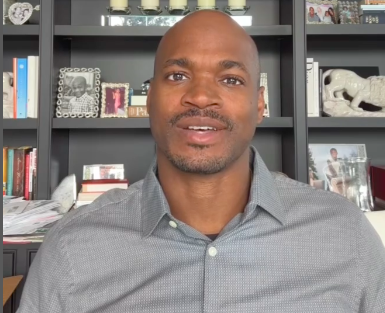Shannon Sharpe and Chad “Ochocinco” Johnson recently discussed Adrian Peterson’s financial fumble — from earning more than $100 million as an NFL running back to facing more than $12 million in debt.

How and Why Peterson Had a Mega Debt
The “Nightcap” hosts took to the Sept. 15 episode of their podcast to examine Peterson’s struggle to manage his wealth after retirement, a challenge many athletes face, after a judge ruled last month that the seven-time Pro Bowl player must turn over assets to help satisfy a debt.
As former star players, they were particularly struck by Peterson’s overspending, recognizing how it undermined his financial success following his impressive NFL career with the Minnesota Vikings.
One particularly egregious example highlighted in the podcast was Peterson’s decision to take out a loan for an exotic-themed birthday celebration, flying in 300 guests first class while showcasing tigers and camels.
“Who takes out a loan to throw themselves a birthday party, unless you’re trying to impress the partygoers?” Sharpe said.
The hosts also discussed Peterson’s potential bankruptcy, with Sharpe pointing out that his credit is likely ruined, leaving him unable to offer collateral due to his financial struggles.
Sharpe emphasized to Johnson that one can have bad credit while still having money, or vice versa.
He shared that he maintains an impressive 800-something credit score and a healthy bank balance, rejecting the notion of spending lavishly to impress others.
“I am not buying a $10 million home. I am not buying a $1 million car. I’m not flying people in,” he stated.
As Finurah previously reported, Johnson is known as one of the NFL’s self-proclaimed cheapskates, famously claiming to eating McDonald’s during his time with the Cincinnati Bengals and sleeping at the stadiums as oppose to renting a place. On the podcast, he mentioned that he does not celebrate his birthday, preferring instead to receive well-wishes from family and friends through prayers, along with an identified Starbucks product and a cigar.
Sharpe analyzed Peterson’s financial situation, estimating that the government would take about 50 percent through taxes. He calculated that Peterson’s agent could take between 3 and 5 percent, while also considering that Peterson may have mishandled around $25 million, Sharpe ultimately determined that Peterson should have at least $25 million to spare, at the worst possible scenario.
A Houston judge has ordered Peterson to surrender assets to help satisfy a judgment, with law enforcement supervising the seizures at his Texas home in Missouri City, USA Today reported last month.
The debt originates from a $5.2 million debt-consolidation loan he took out in 2016, which spiraled into an $8.3 million judgment in 2021.
Peterson played in the NFL from 2007 to 2021, earning the MVP award for his 2012 season with the Minnesota Vikings. His current inability to earn millions like he once did highlights the urgency of his $12 million debt and reflects the financial challenges many athletes face after their careers end.
Complicating matters, the receiver, Robert Berlerth, a Houston-based attorney who collects funds as a bankruptcy lawyer, claims Peterson has been hiding assets, including trophies.
Peterson points the finger at his financial adviser, asserting he was promised the loan would be repaid without using his personal funds.
Peterson is not alone in being a former pro athlete facing financial ruin. Studies show that 16 percent of NFL players go bankrupt within 12 years of retirement, with financial issues often surfacing just two years after they leave the league, according to the Global Financial Literacy Excellent Center.
Additionally, around 78 percent of former NFL players and 60 percent of former NBA players experience bankruptcy or financial distress within a few years of retiring, according to Vermillion Financial.
As noted by Money Smart Athlete, many bankrupt athletes struggle due to a lack of financial literacy and extravagant lifestyles during their 20s and 30s. Transitioning to a more frugal lifestyle can be challenging, and many believe they can recover from poor investments, often to no avail.
“I ain’t playing football in like 12 years, and I’m still living the same lifestyle when I was making money,” Johnson said.
“Ninety-two, 87 percent of us go broke when we done playing,” Johnson said. “This is just one example.”



